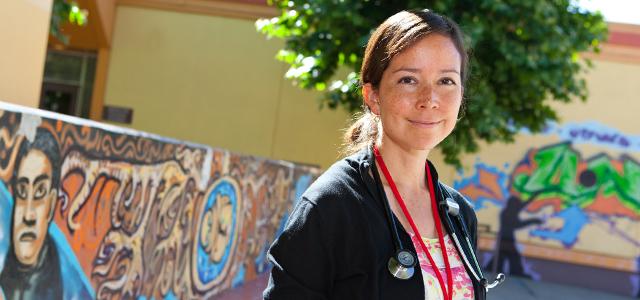
Zena Harvill at United for Success Academy (photo by Elisabeth Fall)
Finding Her Own Path to Nursing
When Zena Harvill was a teenager, her mother went back to school to become a nurse. Harvill admired her mother, especially her focus on caring for children and new mothers, but nursing was not on Zena Harvill’s radar.
“Nursing was something my mother did,” says Harvill, echoing her teen self. Besides, her teachers and advisors at Palo Alto High School thought a high-achieving student like Harvill should aim for medical school and become a doctor. Harvill wound up at Wellesley College, where she pursued premed studies.
Seeking a Meaningful Life
At the same time, she became more curious about her mother’s Navajo roots. Harvill had enjoyed her childhood summer vacations to New Mexico, where she slept in hogans and took part in traditional healing ceremonies, and now, as a young woman, she found herself questioning how her biracial identity fit into the mainstream American path to success on which she found herself. She wasn’t sure how her family’s cultural background would figure into her professional future.
After two years, Harvill left Wellesley, sure she didn’t want to be a doctor but unsure of what else she wanted to do. She returned to Northern California and enrolled at University of California, Santa Cruz, where she earned a bachelor’s degree in linguistics and Spanish. She lived in Spain her senior year and later traveled around South America. After graduation, she landed a job at HighWire Press, an e-publishing platform and a division of the Stanford University Libraries.
Harvill’s job involved producing online science and medical journals, but her role was on the technical side, and she eventually realized that a career in any high-tech field was not for her. Yet being around medical journals at HighWire Press reawakened her interest in medicine.
Still not sure she wanted to be a doctor, she considered her mother’s example. “I began to research the differences between the role of doctors and nurses,” she says.
Her mother’s job was part of the process. A nurse practitioner colleague of her mother’s exposed Harvill to a new and exciting health care role. And while observing her mother’s work in a neonatal intensive care unit, Harvill was impressed by the vital role nurses played.
“It was the nurses, rather than the doctors, who were literally delivering expert, compassionate care to patients and families,” says Harvill. “They had valuable input to contribute to treatment plans, and they knew the patients and families best.”
UCSF School of Nursing and the Native American Health Center
After settling on pediatric nursing, Harvill looked to UCSF School of Nursing, which has one of the few pediatric nurse practitioner (PNP) programs in the state. She applied and was accepted to UCSF’s Master’s Entry Program in Nursing (MEPN). During her time there, two programs exposed her to leadership roles in adolescent health: Nursing Leadership in Adolescent and Young Adult Health (NLAYAH) and Leadership and Education in Adolescent Health (LEAH). Those extra didactic and clinical assignments took her to a variety of hospital and community settings around the Bay Area, including the Native American Health Center.
A Bay Area-based nonprofit, the Native American Health Center operates clinics in Oakland and San Francisco targeting the Bay Area’s Native American population. Harvill felt an immediate kinship with the organization, seeing then how her childhood visits with her Navajo relatives “shaped me as a person.” After her graduation in 2011, Harvill landed a job with the center.
Balancing Work and Family
“Everything about the UCSF program was fantastic,” says Harvill, who is especially grateful for the way the school’s faculty provided plenty of role models for balancing school, work and a new family. While a student, she married Lance Kizer, a scientist she met at the annual Burning Man festival. Together they are parents of a baby daughter, Ruby.
“Juggling work as a recently graduated PNP and a new mother is a challenge, but I am extremely fortunate to have a supportive partner, family and colleagues,” she says.
Her work duties include two days a week at United for Success Academy, one of five middle school-based health centers that are part of Elev8 Oakland. Elev8 is a national initiative funded by The Atlantic Philanthropies and local partners that aims to bring together schools, families and communities in a variety of ways to help middle school students stay healthy and engaged in learning as they make the transition from childhood to adolescence. UCSF received a three-year, $1.75 million grant from The Atlantic Philanthropies to create UCSF’s Elev8 Healthy Students and Families project within the Elev8 Oakland program.
The United for Success clinic is in Oakland’s Fruitvale neighborhood and offers primary medical and dental care to students. Harvill and other staff also work with families, offering them health care or getting them connected to insurance, mental health, and employment and housing services.
The school doesn’t have many Native Americans, but Harvill notes that the students largely come from immigrant and refugee families and are dealing with some of the same socioeconomic challenges with which many Native Americans wrestle. Up to 90 percent of the students live in poverty, and a fair number come from homes with single parents.
Helping these children to make healthy lifestyle choices – from avoiding drug use and gang life to eating well and staying in school – is a constant challenge. Harvill’s own earlier struggles around cultural and professional identity definitely help.
“We want to give these kids a different way to see the world,” she says. “One where they can imagine a different life for themselves.”



